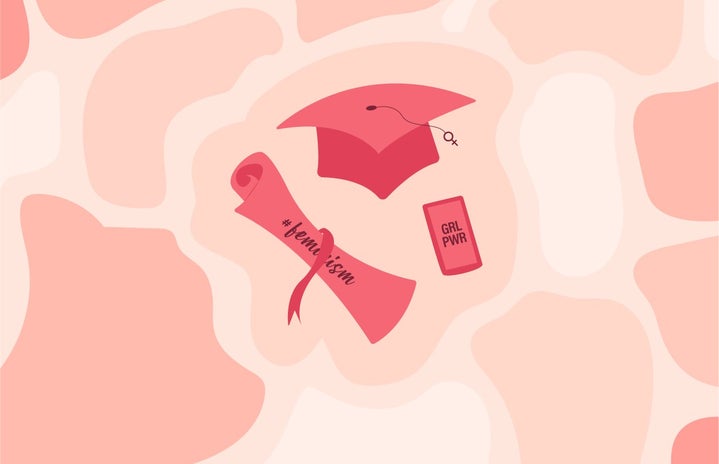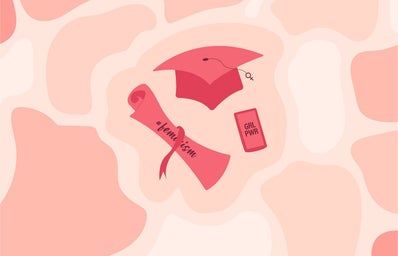Recognizing the current social issues is like a double-edged sword. Society seems bleaker if you’re aware of what’s going on behind the curtain, but being aware means you can ultimately contribute to bettering the state of things.
As a women’s studies major, I will always believe in the latter. Choosing to pursue a degree in women’s studies was an easy yet complicated decision, given how we live right now. Each day, I am outraged by the cases I hear silencing women’s rights. Simultaneously, I’ll see every woman on my campus wearing a “Future is Female” tee, sticking feminist logos on their laptop, and tweeting out in support of #MeToo.
We are living in an incredible moment right now, where feminism has not only become recognized, but trendy. And from my perspective, I often question how I feel seeing my in-depth studies translate into popular culture? And you know, there are a lot of conflicting feelings, actually.
Feminism is one of many topics at the heart of women’s studies discipline. Despite the name, the women’s studies major actually focuses on the relationships between gender, race, sexuality, and class. Given all these elements of identity, seldom do I ever think about helping only women with my studies; I want to serve humanity as a whole.
And that’s why feminism is a complicated idea to untangle, especially when I encounter it in popular culture. There are so many ways in which the public engages with feminism, with some ideas ringing true according to the research I study, while others being misunderstood. As I scroll through my social feeds, watch the news, and talk to my peers, I encounter a whole lot of differing perspectives.
So, here are four sentiments I reinforce on a daily basis as I earn my women’s studies degree while navigating a “woke world.”
1. I’m hopeful when fellow college women contribute valuable insights.
When I hear fellow students talk about feminist issues, my heart fills with hope. Women speaking up is so important to what I study. As a women’s studies major, I’m always taught to seek out the voices of all women, from different backgrounds, races, and classes. My major teaches me to think about privilege and what it means to be one woman who is also of a certain race, class, gender and sexuality and why those differences matter. Therefore, every different voice I hear in between classes, in line at Starbucks, or in my Women’s studies classes means the world to me. These are the voices of different kinds of people and I know I need to hear them to understand our world a bit better.
What’s more is that in my women’s studies classes, I encounter women from a plethora of disciplines. Some students are on a pre-med track while others are into activist work. I, an aspiring feminist writer, activist and lawyer, feel like every women’s studies class period is incredibly insightful. All of us will use this knowledge to make sure whatever field we are in is fairer and juster. Listening to women from different fields is always so interesting. Sometimes outside of my women’s studies classes, I’ll talk to other women about feminist issues. One time, a classmate made a great point on how paid maternal leave should be especially enforced for lower socioeconomic families, and it was so articulate I’d guess that she was studying women’s studies too (plot twist: she wasn’t).
However, in my women’s studies classes, I get to hear my classmates talk more in depth and it’s always so enriching. For example, when a black sister talks about how so-called “liberating” partying culture actually oppresses people like her, I want to do nothing but hype her knowledge up (usually by nodding my head vigorously). Her personal experience is backed up by women’s studies research, like studies which find that black women on average are less likely to hook up at frat parties due to white men thinking of them as “cheap” or “easy” or “overly sexual” in comparison to white women. These women around me live their lives and search to find the wrongs in them, but they come to the table to discuss them and that is absolutely outstanding.
2. The trendiness of feminism is inherently limiting.
Don’t get me wrong, the more feminists, the better! But as someone who’s studying feminist studies, I can see both the pros and cons with making it “trendy.” Of course, if feminism is trendy, then more eyeballs will see it and want to explore it right? It’s wonderful to have more people study feminist ideology because it means more people will contribute to feminist causes. But exactly how many of these “feminists” go beyond just liking posts on Instagram?
We have to remember that everyone is inclined to follow the status quo. Right now, being a feminist is trendy. But it wasn’t always good to be called a “feminist”.
Back in the ’70s, due to media messaging from (of course) patriarchy-controlled companies, being called a feminist was deemed insulting. It could mean you were a men-hating person looking to overthrow all men in power, or an overzealous lesbian (or both). No offense to any beautiful lesbians out there, but demonizing a sexuality based off an ideology is disgustingly wrong. However, nowadays, being called a “feminist” is becoming conveniently trendy, so more people are willing to call themselves as such. Though as a women’s studies major, I’ve learned that bandwagoning feminism is risky and it happens more than we think.
It looks so “woke” to like feminist posts on Instagram or to slap a “The Future is Female” sticker on your laptop, but when you do that, what exactly are you saying? I hope you’re saying that you acknowledge that you have it rough as a woman, but that other women have it rougher than you for reasons you may not immediately understand. I hope that you’re saying you want to listen to women’s experiences before you judge them for yourself. I hope that when you say you’re a feminist, you won’t enable toxic people in power to oppress women who may not be exactly like you but who deserve the same equality as you. I hope you acknowledge the privileges you have just as much as the injustices you face. I hope when you wear your trendy t-shirt, you admit you don’t have all the answers but want to learn them all from listening to yourself and all other women equally.
Basically, I hope your trendy feminism means something more to you and causes you to act on it. To go out and vote for people who will stand with women, to sign petitions for issues you care about, to simply talk about issues with your peers to get to a solution. I hope that your trendy feminism envelopes your everyday life and makes you want to support other women both like, and unlike, yourself.
3. I feel more confident defending ideas, because I know what I’m talking about.
Knowledge is power, right? Studying women’s studies extensively for my degree gives me the authority to educate others on what I’m learning. Albeit, no matter how I well-versed I am, I am never going to just magically know the answer to dismantling toxic patriarchy or bridging the wage gap. But when you comb through years of research and hold complex discussions with other scholars like yourself, you have to know what you’re talking about. In a feminist-trendy world, I feel more confident in joining the conversation because of the knowledge I have. I am always eager to share it with others. For example, when I look at commercial feminism at play on TV and online ads, I have the knowledge to make me think twice about them.
Again, feminism is conveniently trendy, and companies like to take advantage of that. When a Dove commercial screams #GirlPower by including women of different races, skin tones and body types, that’s great. But when they proceed to sell skin bleaching creams, they are contributing to toxic colorism, the precise opposite of what their ads stand for.
From what I’ve learned, skin bleaching is a huge industry that profits off of women feeling ugly for being too dark. Colorism also contributes to why we think of darker women as lesser than lighter women. Poverty myths associated with darkness also come into play, so buying bleaching creams can also demonstrate how financially well off a darker woman actually is, encouraging them to keep buying them.
All of these horrible norms are perpetuated by the same brands who claim to be super “woke”. When it comes down to profit, where did these brands’ precious feminism go? As I pursue my women’s studies degree, I study these types of phenomena all the time. I don’t feel as uncertain about calling brands out because I do have the information to back it up, which I’m always so grateful for.
4. Feminism has to call everybody out, including other women.
There’s a lot of feminist issues that deserve further discussion. White feminism is one of the first that I had to study, but I still don’t believe people truly understand what it is. Firstly, I never want to come off as someone who looks to blame others. I think every person has a role in every issue. In my opinion, no one is absolved of responsibility when it comes to injustice towards women.
But as I’ve learned, everyone has some sort of privilege, some more than others and sometimes we don’t want to see it or admit it. Privilege is a heavy word because when someone tells you you’re privileged, you feel like they’re saying you had it easy. You went through your own trials to get to where you are, and it hurts to be told that you actually had it easy when it feels like you totally didn’t. But acknowledging privilege doesn’t mean dismissing your personal struggles. It means understanding that you, a person of a certain identity, reap the benefits of the system whether you meant to or not.
If you’re white, for example, there’s a whole set of barriers that you don’t have to face even as you pour your blood, sweat, and tears into getting a good education and career. The everyday occurrences in your life are also privileged as well. If a white woman is stopped by a white male cop for speeding, the chance of the woman being in life-threatening danger is slim. But for a black male, of course, it’s a different story. Job interviews, frat parties, college admissions, these are all the institutions which look to benefit only one group while disparaging others.
As a women’s studies major, I know I am privileged in a lot of ways. I’m traditionally able-bodied, cisgender, and heterosexual; these are identities that society privileges. At the same time, I am a woman, an Asian person of color, a Muslim, young and middle class; these are identities which oppose those who are privileged. I have to acknowledge all of these identities and understand what they mean to the social structure I inhabit.
White feminism essentially erases the ideas of privilege. I still remember one of the first unrealistic white feminist ideas I ever encountered. Once in high school, I saw that a white woman on Facebook said she “didn’t need feminism” because she lives a great life where she wants to be at home and cook for her husband while he earns all the money for the household.
First, a white family is already more preferable in most high-end jobs, so her husband has a better shot at maintaining a good, stable income. Then, there’s the implied “choice” that this woman had; if she wanted to, she could work but she chose not to. That choice is a luxury, as many lower socioeconomic women of color can’t afford to stay at home if they want to support their families. These women are often pushed toward lower paying jobs, especially lower-income immigrant women who are trying to build up their wealth from almost nothing. Bridging the national gender pay gap would make it so that these lower-class women could make more money and maybe have more time to spend at home with their families.
It’s understandable that not every person is going to think this far ahead. That is why I am studying women’s studies, so that I can investigate these issues further. But I believe every person has a responsibility to at least try to understand other people’s realities. This one white woman recognized her own reality as the one every other woman faces, which is very wrong. I was in high school and I didn’t know anything about feminism at the time, so I wasn’t in a position to educate her. I didn’t know any better and maybe neither did she. However, that’s why it’s worth revisiting issues, and using the voices of others to give you the context you need to come to a sounder conclusion. That’s what I do every day in class, and while it’s taxing to find answers to problems, I’m so happy this area of study enables me to do so.
As you could probably tell, feminism really can’t be explained in just a word, a t-shirt or a hashtag. It’s an ongoing dialogue that I will probably keep studying until I can barely read the words in my women’s studies textbooks anymore. But it’s a field I’m so passionate about, where I never find what I learn pointless or boring. Every bit of education I receive in this field is precious to me as I try to figure out ways to make the world simply more rewarding and equal to all types of people from all places.
Thanks to this present feminist-trendy world, I have never ever been more engaged. As I finish pursuing my undergraduate degree in women’s studies, I hope I can continue to educate others and be educated by them too. I just need to get over my perpetual shyness, and maybe I can tap the girl next to me in English with the #MeToo sticker on her water bottle and have a little chat with her about it and many other feminist issues I want to explore.


